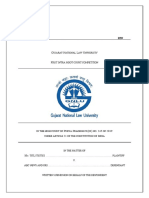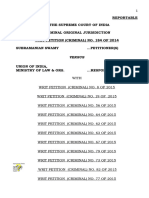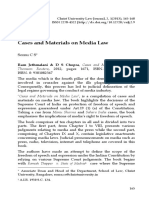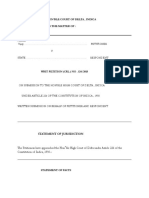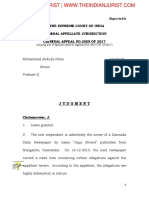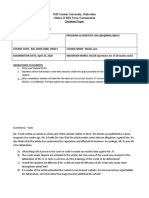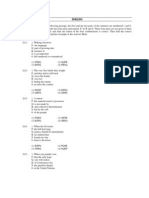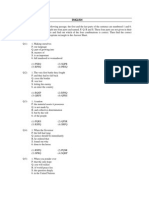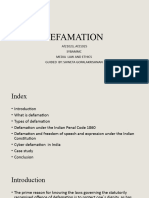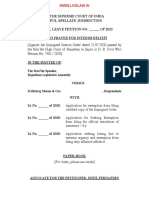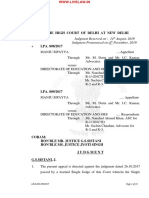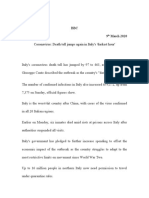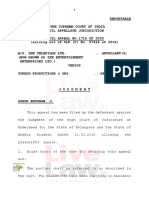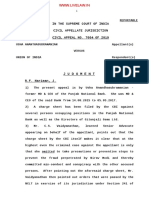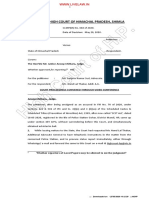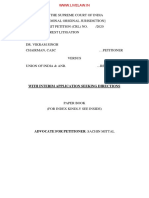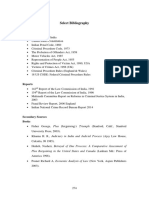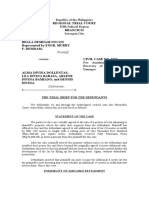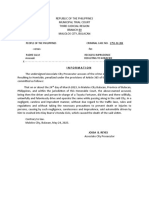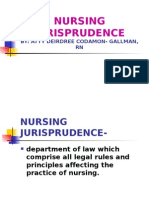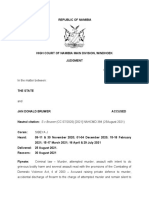WWW.LIVELAW.
IN
BEFORE THE MADURAI BENCH OF MADRAS HIGH COURT
Decided on : 16.10.2019
CORAM :
THE HONOURABLE MR.JUSTICE G.R.SWAMINATHAN
Crl OP(MD)No.5519 of 2015
and
MP(MD)No.1 of 2015
K.Rajanarayanan alias Ki.Ra ... Petitioner / 1st respondent
Vs.
1.P.Kathiresan ...1st Respondent / Complainant
2.The State, rep.by
The Sub Inspector of Police,
Tallakulam Police Station,
Madurai – 625 002. ... 2nd Respondent / 2nd Respondent
Prayer : Criminal Original Petition is filed under Section 482 of Criminal
Procedure Code, to call for the records in P.R.C No.80 of 2014 on the file of
the Judicial Magistrate Court No.2, Madurai and to pass an order quashing
the same as illegal and to grant any relief or reliefs as this Court deems fit
and proper in the nature and circumstances of the case and thus render
justice.
For Petitioner : Mr.M.Siddharthan
For Respondents : Mr.A.Robinson,
Government Advocate (crl.side) for R2
Mr.M.Ayyappan for R1
http://www.judis.nic.in
� WWW.LIVELAW.IN
ORDER
Violence is the most extreme threat to freedom of expression. Many
have paid with their lives for exercising this basic human right. Timothy
Garton Ash in his seminal work “Free Speech” would call it as “the
assassin's veto”. When Ayatollah Khomeini issued fatwa to kill Salman
Rushdie, V.S.Naipaul remarked that assassination is an extreme form of
literary criticism. Long back, an American free speech scholar Harry Kalven
Jr. coined the term “heckler's veto” to describe the way a speaker can be
silenced in a public meeting. To these can be added “the prosecutor's veto”.
It is setting the criminal law in motion to target those legitimately exercising
their right of speech and expression.
2.A recent instance is the registration of FIR in Muzaffarpur District
against 49 celebrities, including Ramchandra Guha, Aparna Sen, Mani
Ratnam. They had written an open letter to the Prime Minister of India
expressing concern over certain developments. A Muzaffarpur based
lawyer Sudhir Kumar Ojha filed a case against them in the court of Chief
Judicial Magistrate. Based on the direction given by the court, an FIR
came to be registered for sedition, public nuisance, hurting religious
feelings and insulting with an intent to provoke breach of peace. This
http://www.judis.nic.in
� WWW.LIVELAW.IN
caused considerable consternation to the enlightened citizenry. It is now
reported that the FIR has since been closed. But, the complainant has
stated that he intends to file a protest petition.
3.One can recall a spate of private complaints filed in various courts
across the country against the renowned artist Maqbool Fida Husain.
Some of his paintings were charged as vulgar and obscene. Justice Sanjay
Kishan Kaul sitting in Delhi High Court (as His Lordship then was) quashed
the criminal proceedings after authoritatively laying down what the law of
obscenity is. This eloquent decision reported in 2008 Crl LJ 4107
(Maqbool Fida Husain vs. Raj Kumar Pandey) concludes on this evocative
note - “A painter at 90 deserves to be in his home-painting his canvass.”
4.The case of the petitioner is no different. K.Rajanarayanan
popularly known as “Ki.Ra.,” is an acclaimed tamil writer. An English
translation of his novel “Gopallapuram” published by Penguin India carries
the following blurb :
“Ki.Rajanarayanan (b.1922) has spent over five
decades gathering the most exotic tales of his favourite land,
Karisal Kadu—the scorched drought-stricken land in Tamil
Nadu. Popularly known as Ki. Ra., he is a powerful
http://www.judis.nic.in
� WWW.LIVELAW.IN
storyteller. His short story ‘Mayamaan’ (1958) is considered
the hallmark of the golden age of modern Tamil literature. An
English translation of his collection of folk tales, Where Are
You Going, You Monkeys?, was recently published to much
acclaim. He has been the recipient of the prestigious
Kalaimamani and Sahitya Akademi awards.”
5.There are many who believe that he deserves the highest literary
honour, namely, the Jnanpith Award. The impeccable standing and
credentials of Ki.Ra., did not however deter the first respondent herein from
filing a complaint before the court of Judicial Magistrate No.2, Madurai
against him. The provocation was the petitioner's interview published by a
magazine “The Sunday Indian” for its issue dated 30th September 2012.
When asked as to why he had not written on Dalit life, Ki.Ra replied that
since he is not acquainted with their dialect, he did not attempt to portray
their lives.
6.The complainant herein found two things seriously objectionable in
the remarks of the petitioner. The complainant belongs to a community
known as “Pallar”, that has been notified as a Scheduled Caste in Tamil
Nadu. They proudly called themselves as Devendra Kula Velalar. In fact, a
section of the community is demanding that they should be independently
http://www.judis.nic.in
� WWW.LIVELAW.IN
categorized and de-notified as a Scheduled Caste. The complainant would
point out that the use of expression “Dalit” has been frowned upon by the
Bombay High Court as well as in the communication issued by the
Governmental authorities. But, more than anything else, he has taken
serious exception to the petitioner's expression “Avan” while referring to the
Dalits.
7.In English, in subjective case, the singular form of the first person
is “I”. Second person singular is “YOU”. The third person singular in the
case of masculine gender is “HE” (subjective case), “HIS” (objective case)
and “HIS” (possessive case). In Tamil, the second person singular and
third person singular can be expressed in two ways : honorific and non-
honorific. Honorific reference in the case of third person singular in
masculine gender will be “Avar”. “Avan” will be non-honorific reference.
Depending on the context, the expression, “Avan” can also be disrespectful.
The complainant would point out that the petitioner while referring to the
other communities has employed the respectful expression ending with “ar”
but while referring to the Dalits, he had employed the expression “Avan”.
According to the complainant, this constitutes an intentional insult to the
Scheduled Castes. The complainant sought issuance of direction under
Section 156(3) of Cr.PC for registering an FIR against the petitioner herein.
http://www.judis.nic.in
� WWW.LIVELAW.IN
Since the case under the Scheduled Castes and Scheduled Tribes
(Prevention of Atrocities) Act, 1989 is triable only by the Special Court, the
case was taken up for committal in PRC No.80 of 2014 and summons were
issued to the petitioner herein. To quash the same, this criminal original
petition has been filed by the petitioner under Section 482 of Cr.PC.
8.Heard the learned counsel on either side.
9.Section 3 of the Scheduled Castes and Scheduled Tribes (Prevention
of Atrocities) Act, 1989 had not been amended when the impugned
complaint was filed. Unamended Section 3 (1) (x) of the Act read that
whoever, not being a member of a Scheduled Caste or a Scheduled Tribe
intentionally insults or intimidates with intent to humiliate a member of a
Scheduled Caste or a Schedule Tribe in any place within public view shall
be punishable with imprisonment for a term which shall not be less than
six months but which may extend to five years and with fine.
10.I took the assistance of Shri.Jagannath, a young Tamil scholar
from Madurai before deciding this issue. According to him, the expression
“Avan” is referred to in Tamil literature more to indicate male gender and
whether it is rude and disrespectful or not would depend more on the
context. Right from Sangam Literature to current day, this expression has
http://www.judis.nic.in
� WWW.LIVELAW.IN
been used to denote even highly revered characters. In Purananooru, Song
No.72, a respected scholar is referred to as 'khq;Fb kUjd; jiytdhf”.
Thirukkural couplet 388 is as under :
'Kiwnra;J fhg;ghw;Wk; kd;dtd; kf;fl;F
,iwnad;W itf;fg; gLk;.”
In Thiruvasagam, the line “mtd; mUshNy mtd; jhs; tzq;fp” is found. In
Thiruvaimozhi by Nammalvar, the opening stanza reads as as under :
'cah;tw cah;eyk; cilatd; atd; mtd;
kah;tw kjpeyk; mUspdd; atd; mtd;
mah;tWk; mkuh;fs; mjpgjp atd; mtd;
JauW Rlub njhOJvOvd; kdNd.”
In Periyapuranam, the phrase 'cynfyhk; czh;e;J xjw;F mhpatd;” is found.
Thus, even God is referred to only as “Avan”. Mahakavi Bharathi has this
to say about certain communities :
'Ntjkwpe;jtd; ghh;g;ghd; - gy
tpj;ij njhpe;jtd; ghh;g;ghd;
ePjpepiy jtwhky; - jz;l Nekq;fs;
nra;thd; eha;f;fd;”.
The Tamil Poet Bharathidasan would describe his mentor as “ige;jkpo;j;
Njh;g;ghfd;> mtd; xU nre;jkpo;j; NjdP> rpe;Jf;Fj; je;ij”. The foregoing literary
instances, classical and modern, clearly show that the expression “Avan” is
not an insulting connotation. On the other hand, it indicates a high degree
http://www.judis.nic.in
� WWW.LIVELAW.IN
of intimacy.
11.There is one other aspect of the matter. The Hon'ble Division
Bench of the Delhi High Court in the decision reported in (2002) ILR 2 Del
237 (D.P.Vats vs. State) holds that if an utterance is not directed against a
member of SC/ST in contradistinction to a group of members of SC/ST or
the community as a whole, it would not again make out an offence under
Section 3(1)(x). The word "a member" occurring in the provision assumes
crucial importance in this context and leaves no scope for doubt that it
must be directed against the individual member and not against a group of
members or the crowd or the public in general though these may comprise
of SC/ST. If it is made in generalized terms against all and sundry and is
not individual specific in the name of caste, it would not make out an
offence under the first sub-section, the rationale being that intentional
insult, intimidation and humiliation made in the name of caste was liable to
be caused to a person and in this case to an individual member of SC/ST
and not to a group of members or public in general.
12.Thus, looked at from any angle, even the elementary ingredients of
Section 3(1)(x) of the Scheduled Castes and Scheduled Tribes (Prevention of
Atrocities), 1989 Act are not present in the case on hand. The next
http://www.judis.nic.in
� WWW.LIVELAW.IN
question is whether the prima facie ingredients of the offence under Section
504 of IPC are present. Section 504 of IPC reads as under :
Section 504. Intentional insult with intent to
provoke breach of the peace -
Whoever intentionally insults, and thereby gives
provocation to any person, intending or knowing it to be likely
that such provocation will cause him to break the public
peace, or to commit any other offence, shall be punished with
imprisonment of either description for a term which may
extend to two years, or with fine, or with both.”
13.The Hon'ble Supreme Court in the decision reported in 2013 (14)
SCC 44 (Fiona Shrikhande vs. State of Maharashtra and Ors.) held as
follows :
“13.Section 504 Indian Penal Code comprises of the
following ingredients, viz., (a) intentional insult, (b) the insult
must be such as to give provocation to the person insulted,
and (c) the accused must intend or know that such
provocation would cause another to break the public peace or
to commit any other offence. The intentional insult must be of
such a degree that should provoke a person to break the
public peace or to commit any other offence. The person who
intentionally insults intending or knowing it to be likely that
it will give provocation to any other person and such
provocation will cause to break the public peace or to commit
any other offence, in such a situation, the ingredients of
http://www.judis.nic.in
� WWW.LIVELAW.IN
10
Section 504 are satisfied. One of the essential elements
constituting the offence is that there should have been an act
or conduct amounting to intentional insult...”
14.Applying the aforesaid standard, by no stretch of imagination can
the remarks of the petitioner be construed as an intentional insult to such
a degree as to provoke a person to break the public peace. The petitioner
had crossed the age of 90. To celebrate the occasion, a magazine
interviewed the petitioner. It posed certain questions. The petitioner
explained as to why he has not chronicled the lives of the members of the
Scheduled Castes. The petitioner did not have any intention to hurt any
one let alone the members of the Scheduled Castes. Therefore, the
essential ingredients of Section 504 are not satisfied in this case.
15.It is true that at the complaint stage, the Magistrate is merely
concerned with the allegations made out in the complaint. He has only to
prima facie satisfy whether there are sufficient grounds to proceed against
the accused. It is not his province to venture into a detailed discussion on
the merits or demerits of the case. The Magistrate has to decide the
question purely from the point of view of the complaint without at all
adverting to any defence that the accused may have. He is not expected to
embark upon a detailed discussion.
http://www.judis.nic.in
� WWW.LIVELAW.IN
11
16.But the above said yardstick and standard cannot be so
mechanically applied even in matters that have clear and direct
implications on free speech. This is because taking offence has now
become a fashion. The magistrate will see if the allegations made in the
complaint are so absurd on the basis of which no prudent person can ever
reach a just conclusion that there is sufficient ground for proceeding
against the accused. He will also see if the proceeding has been maliciously
instituted with an ulterior motive. Following the registration of FIR by the
Muzaffarpur Police, Ramachandra Guha had this to say :
“That Indian politicians, across party lines, have
used colonial-era laws to suppress freedom of expression
should not surprise anybody. What is more disappointing is
that the judicial system has not done more to prevent this
shrinking of democratic space. Motivated petitions aimed at
pre-emptively shutting up democratic and independent
voices assuredly have no place in a court of law. It is time
the Supreme Court issued clear directions to lower courts
so that this pernicious practice of intimidation stops.
Where politicians are increasingly governed by
sentiments of revenge and retribution, citizens look to the
judiciary to more actively play its Constitutional role as
guarantors of liberty and free expression. In this regard,
http://www.judis.nic.in
� WWW.LIVELAW.IN
12
the judges could refer to the maxim that Mahatma Gandhi
offered in 1910, amended for our times as follows: “Every
man [or woman] has a right to hold any opinion he chooses,
and to give effect to it also, so long as, in doing so, he [or
she] does not use [or advocate] physical violence against
anybody.”
Neither the Magistrate nor the Police should exhibit alacrity to take
cognizance or register a case in such matters. Every time they receive such
complaints, they must dust their knowledge of the law relating to free
speech. To start with, I would call upon every Magistrate to go through the
celebrated decision reported in (2016) (4) CTC 561 (Perumal
Murugan'case), authored by Mr.Justice Sanjay Kishan Kaul as the Chief
Justice of the Madras High Court (as His Lordship then was). They must
also read the books Offend, Shock or Disturb by Gautam Bhatia and the
Republic or Rhetoric by Abhinav Chandrachud. The courts must
remember that whenever they play into the hands of people like the first
respondent/complainant, the image of the judiciary as well as the nation
takes a beating. Section 66-A of the Information Technology Act, 2000 was
struck down as unconstitutional taking note of its chilling effect on free
speech. Magistrates must realize that complaints such as the one on hand
produce similar effect and lead to stifling of this fundamental freedom. They
http://www.judis.nic.in
� WWW.LIVELAW.IN
13
must therefore be on guard and adopt a nuanced approach in such cases.
One marker of a civilised society is as to how it treats and respects its
artists, writers and intellectuals. Ki.Ra is now 97 years old. He lost his
wife recently. He is said to have suffered a stroke. Closing the criminal
proceedings initiated against him is the minimum courtesy that the system
owes to him. I have already held that the elementary ingredients of the
offences levelled against him are wholly absent. The very institution of the
impugned prosecution is an abuse of legal process. It is quashed to secure
the ends of justice. This criminal original petition stands allowed.
MP(MD)No.1 of 2015 is closed.
16.10.2019
Index : Yes / No
Internet : Yes / No
Skm
To
1.The Sub Inspector of Police,
Tallakulam Police Station,
Madurai – 625 002.
2.The Judicial Magistrate Court No.2, Madurai.
http://www.judis.nic.in
� WWW.LIVELAW.IN
14
G.R.SWAMINATHAN, J.
Skm
Crl OP(MD)No.5519 of 2015
and
MP(MD)No.1 of 2015
16.10.2019
http://www.judis.nic.in









